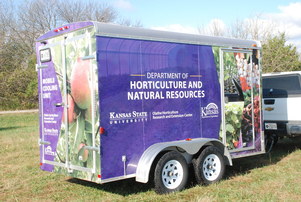
Tomato and Pepper Grafting Trials
This research project looks to investigate the relevance of grafting for Great Plains tomato production in high tunnels as well as examines the impact of grafting and rootstocks on the microbial community living on the roots of the plants. This project is funded by the CERES Organic Trust Research Initiative and the Northcentral SARE program (USDA-NIFA). These are four-season high tunnels and plastic is left on for winter production.
Postharvest Study to Reduce Losses of Organic and Other Locally-Grown Produce While Improving Quality and Extending Shelf Life
Kansas State University and the University of Florida have teamed up to look for ways to improve the quality and extend the shelf life of fruits and vegetables using tomatoes and spinach. The work is focused specifically on aiding small-acreage growers who sell locally and might lack the washing, packing and cooling facilities needed to reduce food postharvest (after harvest) losses. This four-year project is funded by the USDA National Institute of Food and Agriculture.
Sweet Potato Slip Production in High Tunnels
Sweet potatoes are a nutritious crop that grow very well in Kansas and are propagated by stem cuttings called “slips”. The goal of this project is to determine the feasibility and profitability of growing sweet potato slips (propagules) in high tunnels so that grower may be able to grow their own and/or provide slips for other farmers within their areas.
Sustained soil health in organic high tunnels
Managing soil in high tunnels provide numerous challenges due to the intensive cultivation often utilized in tunnels. Soils can become depleted of nutrients and organic matter. Furthermore, the covering on the high tunnel structure excludes natural precipitation and can lead to buildup of salts over time. This projects is to develop a comprehensive and economically viable model to address fertility and soil health issues in high tunnels using cover crop to promote organic sustainable management and financial stability.
KVGA High Tunnel Tomato and Pepper Variety Trials
High tunnel (hoop house) production of vegetables has become very common in Kansas as they protect the crop from wind and storm damage in addition to providing season extension. In this study we are comparing the performance of 10 varieties of tomatoes and 10 varieties of bell peppers to determine what cultivar is best suited for hoop house cultivation in the Great Plains. See www.hightunnels.org for results of previous studies.
Grafted Tomato Rootstock/Scion Combination and Grafted Pepper Trial
These studies are nested within our annual variety trial evaluations that we do in high tunnels. The goal of this grafted tomato study is to determine if certain scion (fruit-producing) varieties do better than others on vigorous rootstock. We are also experimenting with grafted bell peppers that are grafted onto pepper and tomato rootstock. Both studies are funded by a USDA-SCRI CAP grant that is in collaboration with seven other institutions.
Sour Cherries
Sour cherries are used for pie fillings and are typically not eaten fresh. The introduction of a new variety, ‘Carmine Jewel’, has potential for commercial production in Kansas as it is touted as being more tolerant of our hot summer conditions that other dwarf sour cherry varieties. The Kansas Fruit Growers Association planted dwarf sour cherries for observation in 2011.
All-America Selection (AAS) Variety Trials
The AAS Variety Trial Selection program seeks to evaluate new (unreleased) varieties specifically for use in the home garden. We evaluate several vegetable crops including tomatoes, peppers, beans, okra, squash and watermelon, to name a few. This area was planted in raised-beds with plastic mulch (commonly referred to as plasticulture) to reduce weeds and conserve water. There are also no-till crops being grown in this trial as well.
Completed Projects
No-Till Pumpkin, Corn and Beans
This project seeks to develop the use of no-till and minimum tillage production for pumpkin and other vegetable crops in the Great Plains. It is funded by the NRCS Conservation Innovation Grant Program. As opposed to conventional tillage systems, pumpkins are planted through a “mulch” that is grown with fall cover crops like cereal rye and hairy vetch. The cover crop is planted in October-November, and matted down with a “roller-crimper” that is mounted to a tractor.
Mobile Packing Cooler
One of the challenges that small farmers have is the expense associated with walk-in coolers. This cooler is a demonstration unit that we built in 2015 through the support of a grant from the Kansas Department of Agriculture. It uses “cool-bot” technology and a window AC unit to cool the produce inside. This technology is much more affordable and can be powered by a small generator, which means that mobile trailers can be used for packing in the field and bringing goods to market.

